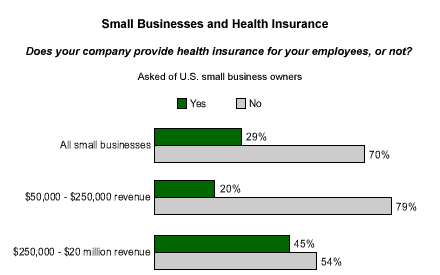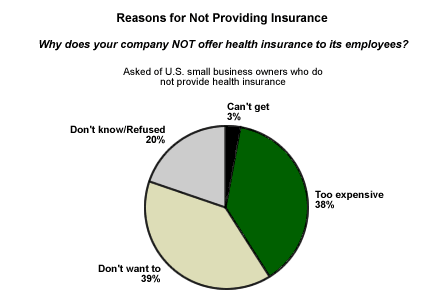The skyrocketing cost of health insurance is an issue that forces every business owner to make difficult choices. But small business owners, who have less of a revenue "cushion" to cover expenses, have particular reason to worry.
That's a big reason why, according to the survey data collected from U.S. small business owners in the fourth quarter of 2003 for the Wells Fargo/Gallup Small Business Index*, only a minority of small businesses -- 29% -- offer their employees health insurance. However, the percentage providing insurance varies substantially by size -- only one in five (20%) of the smallest businesses (those with $50,000 to $250,000 in revenue) provide health insurance to their employees, compared with almost half (45%) of the larger small businesses (those with $250,000 to $20 million in revenue).

When business owners who do not offer health benefits were asked why, roughly equal proportions said either that it is too expensive (38%) or that they simply don't want to offer that benefit at this time (39%). A fairly sizable proportion either declined to provide a reason or said they didn't know (20%). Only 3% of small business owners said that they do not provide health insurance because their companies are unable to get it.

Although most small business owners don't provide insurance for their employees, the majority personally have some form of health insurance for themselves. Among owners who provide no insurance for their employees, 79% said they have insurance of their own.
Small business owners who do provide insurance to employees tend to take on a substantial proportion of the cost. On average, small business owners who provide health benefits report paying 81% of the cost of healthcare coverage for their employees. About two-thirds (64%) of these small business owners pay 100% of the costs, and 81% said they pay at least half the costs. Less than half (44%) of small business owners who provide insurance to employees also provide insurance to their employees' spouses.
The Costs
In order to compensate for the cost of insuring employees, some small business owners must resort to drastic measures. Fifteen percent of small business owners said that they have curtailed hiring because of healthcare costs in the past two years. Sixteen percent said that they have reduced benefits in other areas, and 19% said they have cut back on capital or non-capital investment.
Aside from the cost, 26% of small business owners who provide coverage to their employees said that over the past two years, health insurance has become more difficult for their companies to get.
Bottom Line
Rising healthcare costs can affect small business owners regardless of whether they provide health benefits for their employees. Organizations that can't afford (or choose not to pay for) health insurance for their employees can be at a disadvantage in the labor market.
A small percentage of small businesses (15%) have already curtailed hiring because of healthcare costs. It's easy to imagine this proportion increasing as healthcare costs continue to climb -- an unwelcome trend at any time, but particularly in the wake of a "jobless recovery."
*Results are based on telephone interviews with 594 small business owners, conducted in the fourth quarter of 2003.
For results based on the total sample, one can say with 95% confidence that the margin of sampling error is ±4 percentage points. For results based on 379 businesses with between $50,000 and $250,000 in annual revenue, one can say with 95% confidence that the margin of sampling error is ±5 percentage points. For results based on 215 businesses with between $250,000 and $20 million in annual revenue, one can say with 95% confidence that the margin of sampling error is ±7 percentage points. For results based on 432 businesses that did not offer health insurance to employees, one can say with 95% confidence that the margin of sampling error is ±5 percentage points. For results based on 162 businesses that did offer health insurance to employees, one can say with 95% confidence that the margin of sampling error is ±8 percentage points. For results based on 307 smaller businesses that did not offer health insurance to employees, one can say with 95% confidence that the margin of sampling error is ±6 percentage points. For results based on 125 larger businesses that did not offer health insurance to employees, one can say with 95% confidence that the margin of sampling error is ±9 percentage points.
